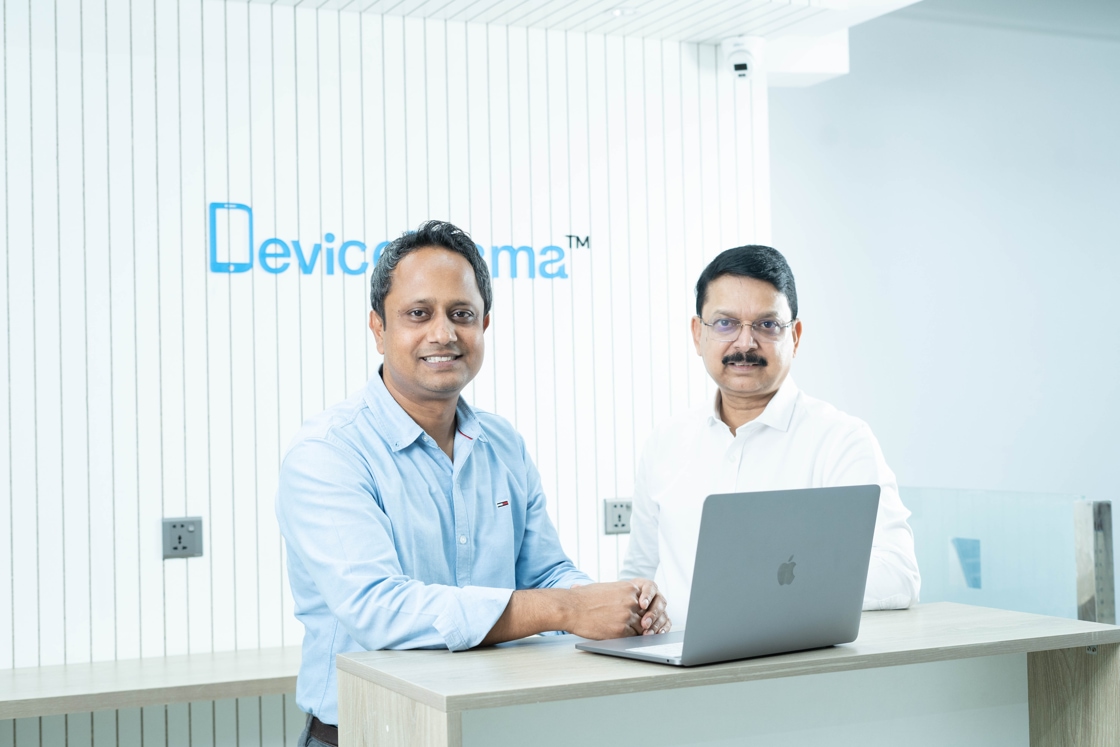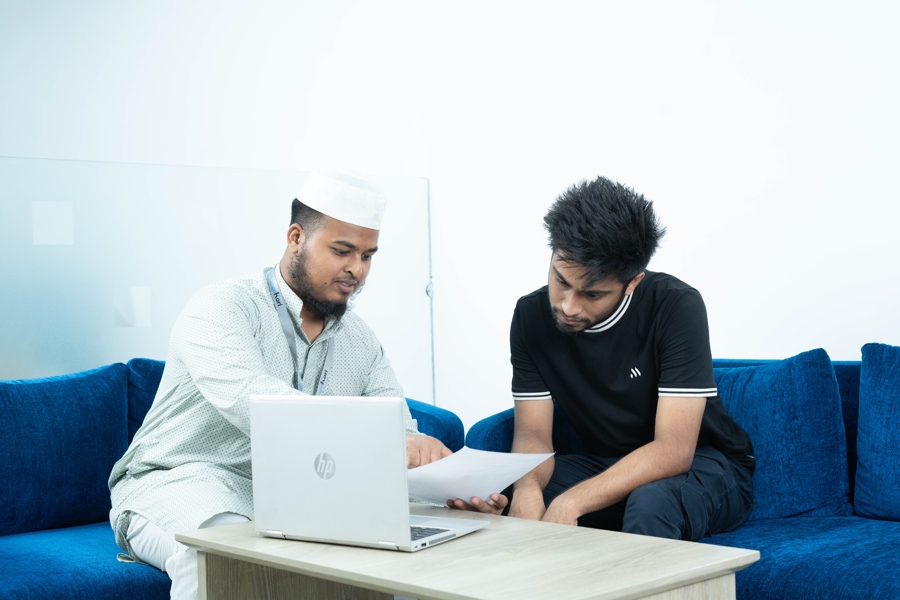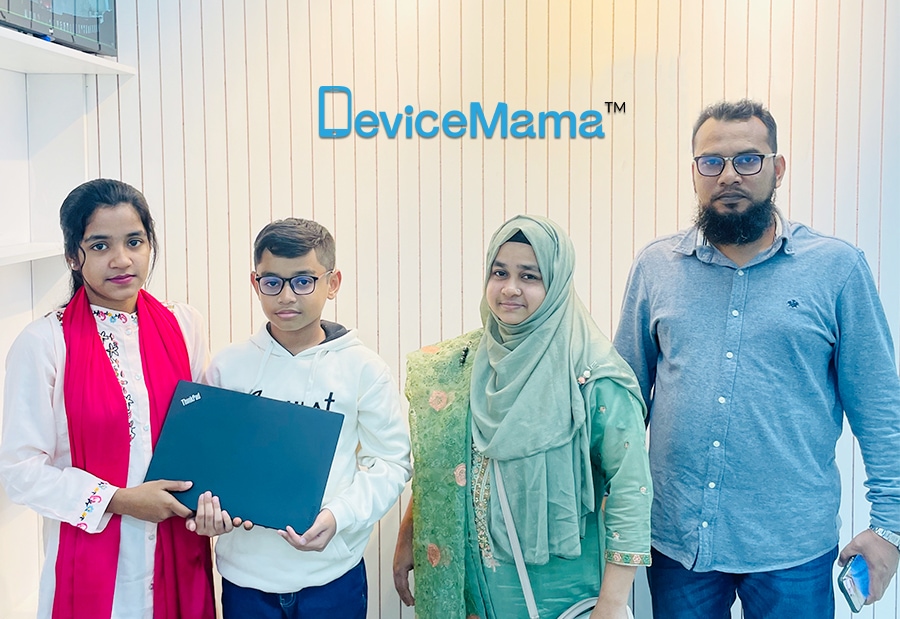
In a cramped internet café in Sunamganj, a rural district in northeastern Bangladesh, 22-year-old college student Fatima Begum unwraps a package containing her first laptop. The device—a refurbished HP EliteBook—cost her 25,000 taka, a fraction of the price of a new model. For Fatima, it’s more than a tool; it’s a lifeline to online learnings, freelance work, and a future beyond her village.
“I thought buying a used laptop meant risking my savings,” she says. “But Device Mama let me check it first. No scams, no hidden defects. Now I’m earning money editing videos.”
Fatima’s story is one of thousands fueling the rise of Device Mama, a Dhaka-based company making technology accessible to more people. In a country where laptop penetration remains a challenge and new electronics remain out of reach for millions, Device Mama has built a thriving business by selling refurbished laptops and desktops with warranties.
But this isn’t just a tale of affordability. It’s a case study in how to disrupt a broken market through quality guarantees, systemic transparency, and an unrelenting focus on trust.
Device Mama, a subsidiary of Exchange Kori Limited, launched in 2016 as a solution to a growing problem in Bangladesh’s electronics market: the lack of trusted channels for buying and selling used laptops and PCs.
Initially launched under System Eye Technologies Limited, Device Mama began as an offshoot of Exchange Kori’s “Shadhin Offer” exchange program, which allowed customers to trade old devices for new ones. As laptops accumulated through exchanges, the challenge quickly became what to do with the growing inventory of second-hand devices. The need for a dedicated sales channel became apparent.
"We considered creating several channels to sell them," explains Rasel Ahmed, Co-founder and CEO of Exchange Kori. "These channels wouldn't just be for selling; they would have Facebook pages, websites, and we planned to brand it as a trusted platform for buying used devices."
What emerged was Device Mama, initially launched as a sister concern or trademark of Exchange Kori, and eventually undergoing a significant transformation. By 2024, the operation had grown significant enough to justify its own corporate entity, with Exchange Kori Limited separating its PC division from System Eye and trademarking the Device Mama brand, strategically positioned to dominate Bangladesh’s refurbished electronics market.
Device Mama focuses on laptops priced between 10,000 and 50,000 taka, targeting a sweet spot where customers can save approximately 50% compared to new laptops.
These devices, sourced from exchanges across Bangladesh, undergo rigorous upgrades:
The company has found success with multiple customer segments:
The company says its sales are nearly evenly split between online (50%) and physical store purchases (50%), with substantial orders coming from outside Dhaka, including rural areas.
On the side of business model, Device Mama operates a hybrid model:
Revenue streams include device sales, service fees, and commissions from resellers.
What distinguishes Device Mama in Bangladesh's competitive used laptop market is its commitment to quality assurance and customer trust. The company has implemented a series of innovative policies.
Exceptional Warranty Policy: Device Mama offers a 50-day replacement guarantee with no conditions or exclusions—significantly exceeding the industry standard of 15 days with numerous exclusions. This comprehensive guarantee extends to even accessories like laptop bags and adapters.
No-Advance Payment System: Addressing widespread fraud in online electronics sales, Device Mama pioneered a no-advance payment model. Customers can inspect products for 10 minutes before making any payment, eliminating financial risk in the purchase process. This has revolutionized trust in online electronics shopping and expanded their market to rural areas.
Quality Standards: Device Mama has established stringent quality standards for its refurbished products. Every laptop sold through Device Mama adheres to minimum configuration standards:
True Replacement Guarantee: Device Mama doesn't repair products under warranty, it provides immediate replacement. If the exact model isn't available, the company offers an equivalent or upgraded model.
Aesthetic Rehab: Scratched lids are re-coated; keyboards are replaced with OEM parts. “We don’t sell ‘used’ laptops,” says Ahmed. “We sell devices rebuilt to outlive their first owners.”
Cost savings: Devices cost 40–50% less than new equivalents, appealing to budget-conscious individuals and corporations.
Environmental impact: Extending device lifespans reduces e-waste, aligning with global sustainability trends.
Corporate Tailoring: For businesses, Device Mama offers free IT audits to match devices to employee needs. A Dhaka-based textile company recently slashed its tech budget by 48% by replacing new laptops with Device Mama’s refurbished units for non-design staff.
These policies address the fundamental anxiety of buying used electronics: will they work properly, and for how long? The company has essentially reconstructed the full product guarantee model typically associated only with new products, applying it to the refurbished market.

The company's true innovation lies not in its corporate structure but in its radical approach to solving the fundamental challenge of buying used laptops online in Bangladesh: trust. Used products e-commerce in Bangladesh, as in many developing economies, operates in what might be termed a "distrust economy." Fraud is a well-known challenge. Sellers frequently create temporary Facebook pages, post images of products stolen from legitimate businesses, collect advance payments from customers, then disappear, phones switched off, pages deleted.
"Recently, there have been many fraud incidents related to buying used laptops or electronics online," says a representative of Exchange Kori. "Sellers take an advance of 3,000, 4,000, or 5,000 taka for a 20,000 taka item... they pay the advance, say 2-3,000 taka, and ultimately, they don't receive the product."
Device Mama's solution is disarmingly straightforward: eliminate advance payments entirely. Customers only pay after receiving and inspecting the product for 10 minutes. This policy applies even for deliveries to district headquarters or anywhere in Dhaka city. The company absorbs the financial risk, if a customer refuses the product, Device Mama loses approximately 1,000 taka on two-way delivery charges.
Only for deliveries to remote village locations does Device Mama require a modest 600 taka advance, still less than its actual courier costs of 800-1,000 taka. The policy has transformed consumer behavior, with many rural customers now traveling to district headquarters to avoid even this minimal advance payment.
Particularly revealing is the demographic breakdown of Device Mama's customer base. While individual end-users constitute the bulk of its business, corporate clients now represent approximately 30% of its customer base. This reflects a significant shift in corporate purchasing attitudes.
"Previously, the perception was that only individual end-users would buy used laptops," Ahmed explains. "But that idea has changed a lot. Now, CFOs and owners of even large companies, top executives, are seeing that using slightly used devices doesn't cause any problems with their work or productivity, but the budget is reduced by 50%."
The company's current volume—approximately 1,000 clients monthly with over 50,000 devices processed since inception—suggests significant penetration into what was previously a fragmented market dominated by individual sellers and small shops without standardized quality measures.
Perhaps most surprising has been the rapid adoption in rural areas. Small technology training centers and polytechnic institutes at the upazila (sub-district) and union levels have become reliable customers, often referring their students to Device Mama. This rural market has proven so vital that the company now plans to establish physical distribution centers across Bangladesh, starting with pilot projects in Sunamganj, Munshiganj, and Tangail.
Device Mama has experienced remarkable growth over the years. Between 2023-2024, the company saw approximately 40% year-over-year growth and it aims to maintain 30-40% growth moving forward.
To date, it has served close to 1,000 clients monthly and has processed over 50,000 devices since inception.
This growth stems partly from changing market perceptions. Initially, used laptops were considered viable only for individual end-users. Now, even large corporate clients recognize that properly refurbished devices can reduce technology budgets by 40-50% without sacrificing productivity.
Device Mama operates from two physical stores in Dhaka (Tejgaon and Mirpur) while maintaining a substantial online presence. Its team structure includes separate service personnel dedicated specifically to Device Mama operations, with some top management and administrative functions shared with Exchange Kori.
The company has ambitious expansion plans. It is working to build a nationwide distribution network, establishing district-level distribution channels with local inventory across Bangladesh (already piloting in Sunamganj, Munshiganj, and planning for Tangail). In Dhaka, the company plans to open additional physical stores in Uttara and Dhanmondi
Device Mama also aims to expand its service model, expanding its pick-up, drop-off, and on-site support services through area-based support engineers working from home or co-working spaces.
By 2030, Device Mama aims to capture 5% of Bangladesh’s monthly PC demand (60,000–80,000 units), leveraging post-pandemic remote work trends and corporate cost-cutting.
Despite its meaningful success, Device Mama faces challenges from competitors selling inferior products at slightly lower prices without warranty protections. The company has chosen to maintain quality standards and comprehensive warranties even when it means pricing products 1,000-2,000 taka higher than competitors. It is also working to overcome misconceptions about refurbished laptops, including concerns about data security on used devices, performance capabilities, and component replacement and repair history.
To address these concerns, Device Mama devotes approximately 50% of its content marketing to educational awareness, explaining appropriate configurations for different use cases and challenging the notion that everyone needs high-end, expensive laptops.
Beyond building a successful business, Device Mama positions itself as contributing to both economic and environmental sustainability. By extending the lifecycle of electronic devices in Bangladesh from an average of 8 years to potentially 12-14 years, it helps reduce electronic waste while making technology more affordable.
As one executive noted, "In the current global crisis, reuse and recycling are becoming popular. In Bangladesh, people should become aware of this more quickly and understand that used devices can be used for many more years and that it doesn't harm an organization's productivity."
Device Mama's success challenges several pieces of conventional wisdom about electronics markets.
1. Rural customers will buy expensive products online. The company has disproven the notion that rural customers won't spend significant amounts on electronics without physical inspection. By eliminating financial risk through its no-advance-payment policy, it has unlocked substantial demand in areas previously considered non-viable for e-commerce.
2. Refurbished electronics can be sold with new-product guarantees. By establishing a 50-day replacement guarantee with no exclusions, Device Mama has fundamentally altered expectations in the refurbished market, bringing it closer to new-product standards.
3. Support services can extend beyond urban centers. Its home delivery, pick-up, and drop-off services extend even to elderly customers needing assistance with basic setup. When corporate clients purchase laptops, support engineers will transfer data from old to new devices, a service rarely available in traditional retail.
4. Corporate clients will adopt refurbished technology. Perhaps most significantly, Device Mama has demonstrated that even large corporations will adopt refurbished technology when properly positioned as an economically and environmentally responsible choice.

Several key lessons emerge from Device Mama's growth story:
Trust as a Business Model: By creating policies that eliminate customer risk (no-advance payment, comprehensive warranties), Device Mama transformed the perception of buying used electronics online.
Standard-Setting in Unregulated Markets: In a largely unregulated market, Device Mama's self-imposed quality standards created a competitive advantage and brand differentiation.
Education as Marketing: The company’s focus on customer education rather than pure promotion has helped overcome market misconceptions and expanded its potential customer base.
Rural Market Potential: Contrary to conventional wisdom, the company discovered significant demand for higher-value electronics in rural Bangladesh when trust barriers were removed.
Strategic Segmentation: By maintaining Device Mama as a distinct brand rather than integrating it into Exchange Kori, the company preserved brand equity while creating clear positioning for different customer journeys.
Device Mama’s rise mirrors cultural shifts toward circular economies. For Bangladesh—and similar markets—it proves that affordability need not compromise quality. As CEO Ahmed notes, “Reuse isn’t just frugal; it’s smart business.” In an era of resource constraints, Device Mama isn’t just selling laptops—it’s reshaping how consumers approach technology, one refurbished device at a time.
Back in Sunamganj, Fatima Begum edits a wedding video on her Device Mama laptop. The software runs smoothly—a minor miracle for a machine that’s crossed three owners.
“People used to laugh at ‘used’ things,” she says. “Now they ask me where I bought it.”
In a world obsessed with the new, Device Mama’s quiet transformation suggests a radical idea: Sometimes, the best way forward is to give old technology a second life.
Cover photo: Device Mama Founders: Rasel Ahmed and M Ahsan Habib (from left to right)
